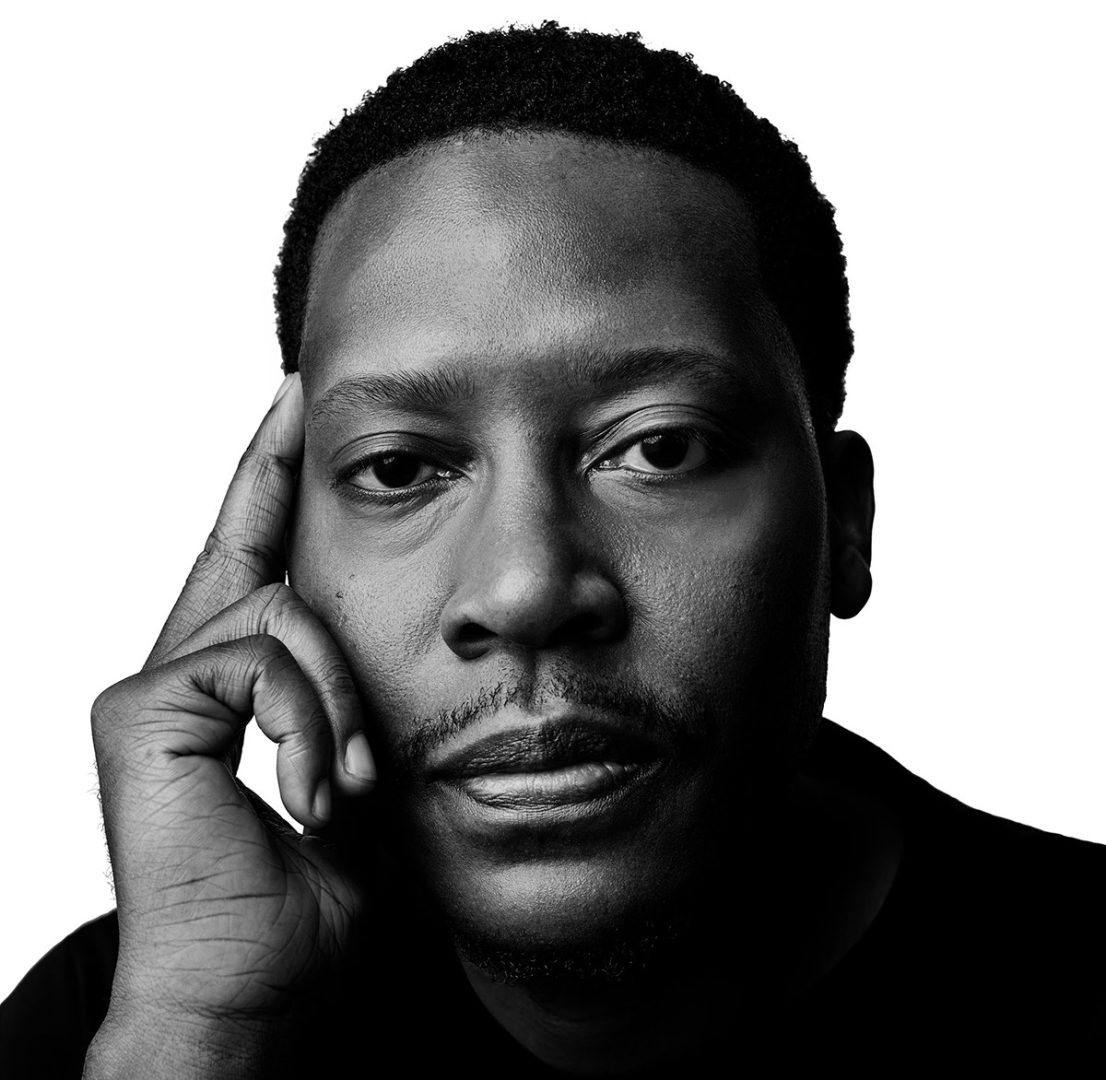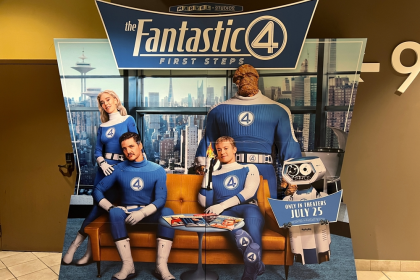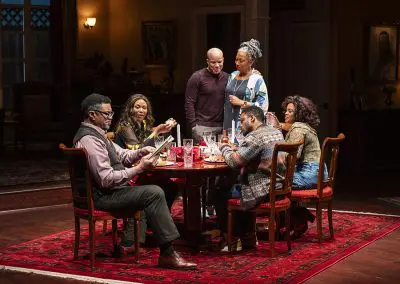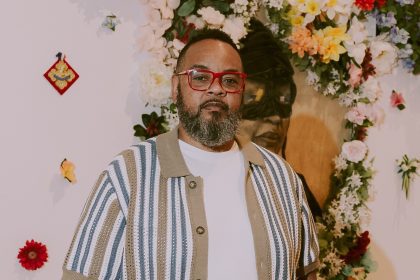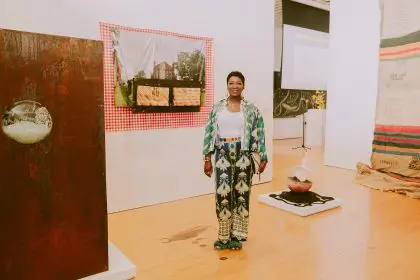Namir Smallwood’s presence is unmistakable, measured and thoughtful, with the kind of quiet intensity that has become his signature on stage. Currently starring as Buddy in Suzan-Lori Parks’ “The Book of Grace,” Smallwood brings a raw authenticity to a character grappling with trauma, family dysfunction, and the desperate search for connection.
The accidental calling
At 14, Smallwood stumbled into his vocation through a summer academic enrichment program. “We had to figure out electives to take because it mimicked the high school experience,” he explains. “I chose to do the Drama Club, and we devised this skit about a son who hadn’t seen his father in 25 years.”
What happened next surprised even him. During the performance, he spontaneously began crying, triggering genuine emotion from his peers. “Everybody was like, ‘Yo, you should be acting,'” he recalls. “From that day, it was like, ‘Okay, this is what I’m supposed to do.'”
But when asked about the first role that made him feel he had truly “arrived” as an actor, Smallwood offers a striking admission: “I don’t think I’ve had it yet.”
Chosen by the work
Unlike actors who meticulously hunt for specific roles, Smallwood describes a more intuitive connection to his craft. “These plays choose me,” he says. “I love plays, I love reading them, I love being in them. When I read a script and think, ‘Oh man, this is really good,’ it touches me in a place where I can tap into something, another part of myself I didn’t know I had.”
This philosophy led him to the complex character of Buddy in “The Book of Grace,” though his appreciation for the role evolved over time. Initially encountering an early draft of Suzan-Lori Parks’ script, Smallwood saw potential but admits, “I didn’t truly get it.” When a revised version arrived in October of last year, however, it “blew me away.”
Buddy’s circumstances resonated deeply, a man returning to his abuser’s home after 15 years, desperate for help. “Can you imagine going to the person who caused you the most trauma in your life for help?” Smallwood asks. “That must mean you really have no other lifeline.”
He draws alarming parallels between his character’s psychology and contemporary phenomena: “You think of school shooters and January 6th people, these are people looking for a lifeline.” This understanding of desperate circumstances forms the foundation of his approach. “How did you get here? And how are you going to get out of it? If you do.”
Finding universal humanity
The themes of “The Book of Grace”, family conflict, misunderstanding, and the search for forgiveness, resonate widely in an increasingly divided world. “There’s a lot of things that we as children don’t understand about our parents, and our parents have their own things they’re dealing with,” Smallwood observes. “There is no instruction manual for parenthood. You can think you’re doing the right thing, and it could be causing a lot of damage.”
At the heart of both the play and Smallwood’s philosophy is the concept of grace itself. “Everyone isn’t deserving of grace, but we get it anyway,” he says. “In this world we live in now, that’s something I think everybody can hold on to because it’s really bleak, but there is some grace. We need grace with each other, grace with ourselves in order to move forward and move the needle in a positive direction.”
This perspective informs his view on what Black theater offers both artists and audiences. “An authenticity and a truth, to see that humanity is universal,” he states firmly. “It’s not about color, it’s not about creed. It’s not about where you’re from, it’s universal.”
Black theater, for Smallwood, becomes a vehicle to demonstrate the multitudes contained within the Black experience. “We aren’t monolithic, and we have trillions of stories,” he emphasizes. “If you are not of an African American background, you will see your father, you will see yourself, you will see your mother, you will see your grandparents. We’re human, just like everybody else.”
Authenticity as foundation
When asked about representation in his career, Smallwood shifts the framing. “I don’t know, and I say that because I am who I am. Every role that I do, I’m Black first,” he explains. “I can play Romeo in ‘Romeo and Juliet’, I’m still Black.”
Yet he clarifies that this identity is not limiting but foundational: “I’m not blackity-black-black. No, it’s I’m a human being who happens to be from this specific culture, and I take who I am with me everywhere I go.”
This authenticity extends to how he approaches characters unlike himself. For Buddy, a military veteran with mental health struggles, Smallwood draws on familial connections, his father and brother both served in the military, while focusing on universal psychological patterns.
His analysis of radicalization proves particularly insightful. “It’s very easy to be radicalized,” he observes. “All you have to do is be in a place where you feel like you’re misunderstood. You’re not getting anywhere, you’re lost, and you don’t know how to find your way back.” The vulnerability created by isolation makes people susceptible to harmful ideologies. “All you need is somebody to say, ‘Hey, I’ve been there. I know exactly where you are.'”
Mentors and models
Smallwood’s career has been shaped by significant theatrical mentors. “One of the biggest influences I’ve had in my career is a director named Marion McClinton,” he shares. McClinton, August Wilson’s director for a decade, provided crucial opportunities during a challenging period when Smallwood couldn’t “buy a job in Chicago for five years” despite previous success at Steppenwolf.
Another mentor, actor James Williams (known as JDub), helped define what Smallwood calls “the Wilsonian craft.” Among his contemporary inspirations, he cites Jeffrey Wright as “one of my all-time favorite actors because he’s a chameleon, and that’s what I want to be.”
These influences have helped shape Smallwood’s career at Steppenwolf, which he describes as “a gift that I didn’t know that I needed.” The stability of a theatrical home has been transformative for someone accustomed to the freelance nature of acting. “When you have a home, you can help make decisions, help shape the theater, they give you work. Everybody is not fortunate enough to have that.”
A message for the future
For young Black actors following his path, Smallwood emphasizes self-knowledge with striking repetition: “Know who you are, know who you are, know who you are, know who you are.” This mantra reflects his understanding that the industry can be transformative but also potentially destructive.
“The idea of school is to tear you down and build you back up,” he explains. “Your goal is to be your authentic self, not who you think you are, not who people think you should be.”
This emphasis on authenticity isn’t merely artistic philosophy but survival strategy. “This business costs a lot,” he warns, and not just financially. “It is a spiritual thing, and it is an emotional thing, and mental. So know who you are multi-dimensionally as a human being, and take care of yourself, so you can take care of others.”
As “The Book of Grace” continues its run at Steppenwolf Theatre through May 18, followed by Smallwood’s appearance in “You Will Get Sick,” his absence from social media stands out as a rarity in contemporary acting careers. For those wanting to experience his work, there’s only one option: “Come to the theater,” he says simply.
In a world increasingly mediated by screens and algorithms, Smallwood’s invitation feels like its own form of grace, an opportunity for direct human connection through the timeless medium of live performance, where universal truths can still be discovered in the particular experiences of complex characters like Buddy. And perhaps, in witnessing these stories, audiences might find their own path toward the grace our fractured world so desperately needs.

